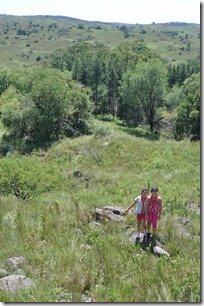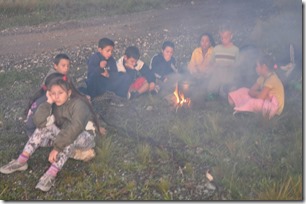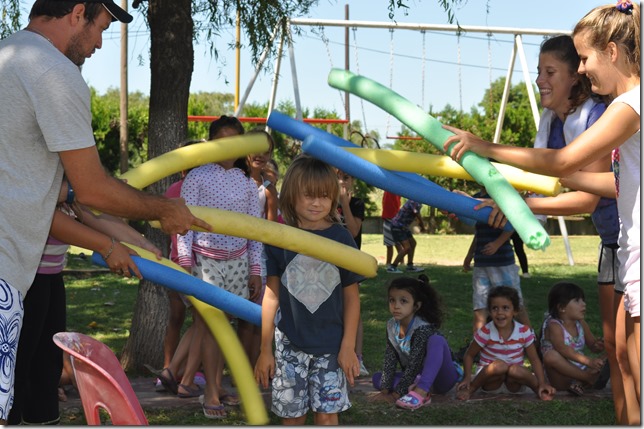“It’s that time of year, when Spring is in the air… “ (Spitting Image song, and it’s funny how March still feels like spring to me despite having lived in the southern hemisphere for the last decade), when we have to think about filing in the dreaded annual review form and trying to define goals and strategies for the year ahead. I instinctively react against writing strategies. Then I ask, why would having a plan be a bad plan? Especially if the alternative is no plan. And then I realise that my problem isn’t with having a strategy, but that I want to distance myself from ideas that I have perceived from (let’s set up a straw man situation here and call it) “a certain strand of commuter belt churches” around what it means to be strategic in mission.
In my church of straw men, there are two main models of mission strategy. The first is sometimes referred to as “mission mobilization”, and it involves gathering lots of Christians together to talk about mission. This model appears to measure its success according to air-miles travelled, countries visited, and number of Christians attending each conference. I confess I find this model quite difficult to take seriously, so I expect I must be missing something because lots of people seem to have bought into it. My key question would be how much mission actually happens as a direct result of such events? This is probably the mission equivalent of the question about how many of the people who went forward at the old Billy Graham rallies were still in churches five years later? Ah yes, but wouldn’t it all have been worth it just for one? How about the parable of the shepherd? True, except that the shepherd had only lost one sheep, and he dedicated all his energy to finding the sheep, not to putting on a show for those which weren’t lost. In a situation with lots and lots of missing sheep, might not a few more be rescued by putting scarce resources to less self indulgent and more imaginative use?
The second model is more compelling in that it does include doing some mission. This model is often couched in language of “being strategic”, particularly referring to targeting “key” or “strategic” others. It frequently involves variations on a theme of sending people from location A, to identify “key” people in location B, to train them to go and “do” mission in location C. As models go it has practical merit. We start to see developing ideas of sustainability, ability to be replicated, and particularly how it might be useful where people from location B are more welcome in location C than those from location A – Latin Americans versus Europeans going into north Africa for example.
However, if we start at the top, because the top is also where the model starts; control is seated within location A. Money comes from location A, and the people sent from location A recognise the “key” people of location B according to an image of that which is valued in location A; usually qualified, connected, articulate, educated people who are already doing well in both secular and religious contexts. These “key” people are then given access to training and funding in order to replicate themselves in “mission”.
In this model the teaching and modelling contradict each other. The teaching says “Jesus went to the people on the margins”, “Jesus sought out the people who society forgot”, “Go and do thou likewise”. But the location A people doing the teaching are usually themselves establishment types who have sought out establishment candidates from location B. So, when location B people finally make it to location C, which will they apply; the teaching or the practice? Will they roll up their sleeves and get grimy, or will they make friends with a bunch of people like themselves and tell them to go look out for the poor?
This second model reminds me a lot of the economic policy embraced by the UK national government back in the 1980’s. Known as “trickle down”, the idea was that providing tax cuts to the richest was somehow going to put money into the hands of the neediest. Admitting the failure of this policy was one of Margaret Thatcher’s biggest climb downs. So it is something of a wonder some thirty years later that mission strategists still manage to act as though targeting the well connected would be the best route to put the gospel into the domain of those on the margins. I suspect that the main reasons for the continued popularity of this model could be quick results and good photos, both of which are helpful for ensuring continued funding – power resides in location A remember. It is quicker and more photogenic to design a trajectory into ministry for someone already well connected then for someone with whom our early goals might include finding them sober and persuading them not to drop fag-ends on the lawn.
And those two models are I suspect the reasons why many (most?) mission organisations are essentially monocultures, even including those organisations whose members come from different passport issuing states. And also why so much of what is referred to as “mission” in our current local context turns out to be little other than pastors replicating caricatures of Christian tourism and serial conference attendance which they have seen modelled (it’s Tuesday, must be Holland).
So, having anathematised a straw man in nine hundred words, it would be fair challenge to ask if I have any alternative with which to replace him. And, as it happens, I do. But it is a work in progress, so if I can ask you to bear with me. The model of mission that I am currently thinking about is Hosea and Gomer. Yes, and? Er, that’s it; Hosea and Gomer, a model for mission strategy.
OK, still bearing with me, how are we going to unpack this? And where are we going from here? Here is my raw thinking.
Hosea was the guy in the Old Testament minor prophets who God told to take an unfaithful woman (possibly a prostitute) as his wife, and then to take her back again when she was unfaithful.
First of all, I am probably not suggesting that folk should marry a prostitute in order to operate in mission. This story works for me on several different levels. In the first instance it was initiated by God. God told Hosea. If I am starting to plan the year with “my goals” then I am in danger of forgetting that mission is God’s mission and he will do what he will do. Of course that gives us a whole bunch of other issues (in addition to the one about what sort of God asks someone to take a prostitute for a wife), like how do I know what God wants from me, especially when he doesn’t often reveal his plans, and particularly not a whole year in advance because I’m trying to fill in my annual review form.
Then it works as act of inclusion towards Gomer. Despite her promiscuity Hosea takes her as his wife, and then takes her back as his wife.
Then it works as a challenge to those around who already considered themselves to be God’s people. In the book of Hosea this challenge is made particularly explicit by God’s spoken prophecy against Israel being given in parallel with the acted story.
Then it works to demonstrate something of God and his character to the wider watching world; God is sovereign and his will will be done.
And finally it reveals something of God to Hosea himself, both as protagonist of the story and recipient of God’s speech-action.
So we have a multi-layered model; God initiates, an act of inclusion and growing for the direct recipients of the action, which serves as a challenge to the church, and demonstrates God’s character to the wider world. Jesus himself also demonstrated these same layers in many contexts, most of all in the healing miracles, but also in other acts of inclusion like the Samaritan woman at the well, and he also made the same model explicit in his teaching, particularly in the parables.
And if so, so what? Well I think we have ourselves the beginnings of a model of mission something close to what Lesslie Newbiggin would have referred to as “acted parables for the kingdom” (don’t ask me for a reference he wrote a lot of books!).
And therefore? I wouldn’t want to be so arrogant as to suggest that we are very often close the centre of God’s will, but I do believe that quite a lot of the things that have happened over our last few years here have been about God’s acted parables which He has put across our way, and which we could never in a million years have imagined in advance. Take an ex-prisoner into your home, along with his insanely jealous wife, and demonstrate what it means to shop, cook, clean and provide for someone who hates your guts for no better reason than that you also have two X chromosomes. That was a few years ago, and despite it all, we are all good friends, and the prison authorities are also quoted as saying that the main reason for ex-prisoner’s continued success is nothing to do with any rehabilitation that happened in the prison, but that he “found religion” (sic.). This year we are finding out about parenting a Teen who has no functional memory of what it means to live in a house. Steps of progress so far have included details such as remembering to shut the fridge after you, and it is probably going to be a long time before we can safely leave any valuables around. Now define any of that in four numerically measurable “Smart” goals on a piece of paper with a year’s notice… especially given that a year ago we had only recently met Teen and certainly had no plans to foster her!
Now back to that review form. How might I define my goals for 2015 in approximately two centimetres of white page? “Be prepared for whatever bonkers schemes God might put in our path this year”? And even though at the end of the year we almost definitely won’t be able to say “can we count it?” we are still hoping that some good people like you will want to come along and share the adventure anyway.










